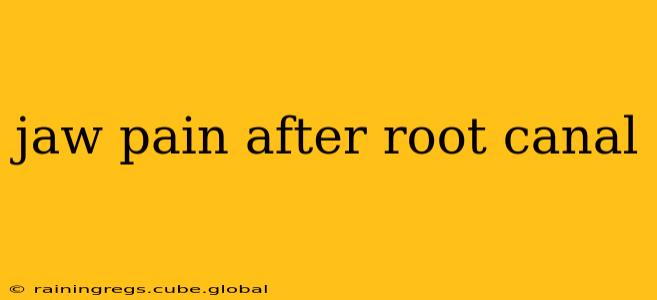Experiencing jaw pain after a root canal is unfortunately not uncommon. While a root canal aims to alleviate toothache by removing infected pulp, the procedure itself and the subsequent healing process can sometimes lead to discomfort in the jaw. Understanding the potential causes, effective treatment options, and when to seek immediate medical attention is crucial for managing this post-procedure pain.
Why Does My Jaw Hurt After a Root Canal?
Several factors can contribute to jaw pain following a root canal. It's important to differentiate between normal post-operative discomfort and something more serious. Let's explore some of the most common causes:
1. Inflammation and Swelling:
The root canal procedure involves manipulating tissues within the tooth and surrounding areas. This can cause inflammation and swelling, which can, in turn, put pressure on the jaw muscles and joints, resulting in pain. This type of pain is usually temporary and subsides as the inflammation reduces.
2. Temporomandibular Joint (TMJ) Dysfunction:
Stress, clenching, or grinding your teeth (bruxism) can exacerbate jaw pain, especially after a root canal. The procedure itself may also inadvertently trigger or worsen pre-existing TMJ problems. The jaw muscles may be strained from the procedure or from unconsciously clenching in response to post-operative discomfort.
3. Sinus Infection:
The proximity of the upper teeth to the sinuses means an infection in the sinuses can sometimes manifest as jaw pain, particularly after a root canal. The inflammation and pressure from a sinus infection can radiate to the jaw, making it difficult to distinguish from pain solely related to the root canal.
4. Referred Pain:
Pain originating from the tooth itself can sometimes be felt in the jaw. Nerves in the area are interconnected, and pain signals can be misinterpreted by the brain as originating from the jaw rather than the treated tooth.
5. Infection or Complications from the Root Canal:
While rare, a persistent or worsening infection after a root canal can cause significant jaw pain. This might indicate incomplete treatment or a complication arising from the procedure.
What Can I Do to Relieve Jaw Pain After a Root Canal?
Many at-home remedies can help manage mild jaw pain after a root canal:
- Over-the-counter pain relievers: Ibuprofen or acetaminophen can effectively reduce pain and inflammation. Always follow the recommended dosage on the packaging.
- Ice packs: Applying ice packs to the affected area for 15-20 minutes at a time can help reduce swelling and numb the pain. Ensure you protect your skin with a thin cloth between the ice and your skin.
- Warm compresses: After the initial swelling subsides, warm compresses can help relax tense jaw muscles.
- Gentle jaw exercises: Your dentist or orthodontist might suggest specific gentle exercises to improve jaw mobility and reduce tension.
- Soft foods: Stick to soft, easily chewable foods to minimize stress on your jaw.
- Stress management techniques: Relaxation techniques such as meditation or deep breathing exercises can help reduce clenching or grinding, particularly if TMJ is involved.
When Should I See a Dentist or Doctor?
While some discomfort is expected after a root canal, you should seek professional help if:
- The pain is severe or worsening: Pain that doesn't improve with over-the-counter medication or home remedies should be evaluated by your dentist.
- You experience swelling that is spreading or significant: This could indicate a serious infection.
- You have difficulty opening or closing your mouth: This suggests potential TMJ problems.
- You experience fever, chills, or other signs of infection: This requires immediate medical attention.
How Long Does Jaw Pain After a Root Canal Last?
The duration of jaw pain varies significantly depending on the cause and individual response to treatment. Mild discomfort usually resolves within a few days to a week. However, persistent or severe pain lasting longer than a week warrants a visit to your dentist.
Can I Prevent Jaw Pain After a Root Canal?
While not all jaw pain is preventable, taking proactive steps can minimize the risk:
- Discuss concerns with your dentist before the procedure: Ensure you understand the potential risks and complications.
- Follow post-operative instructions carefully: Adhering to your dentist’s instructions regarding pain medication, diet, and oral hygiene is essential for proper healing.
- Manage stress levels: Stress can exacerbate TMJ and other jaw problems.
- Be mindful of teeth clenching or grinding: Try to be aware of your jaw habits and practice relaxation techniques.
Remember, this information is for general knowledge and doesn't replace professional medical advice. Always consult your dentist or doctor if you have concerns about your jaw pain after a root canal. They can provide a proper diagnosis and recommend the most appropriate course of action.
